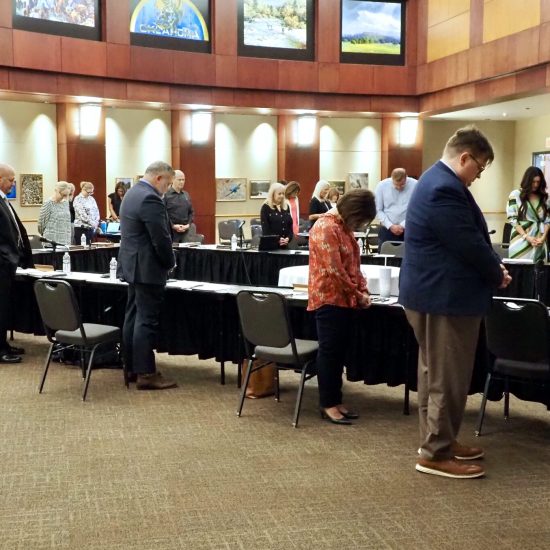

Priscilla Du Preez / Unsplash
State Rep. Reggie Stoltzfus, R-Paris Township, has filed legislation proposing to allow Ohio’s public school districts to employ chaplains. The proposal comes after Texas lawmakers approved a similar measure over the objections of civil rights groups, academics, and even some chaplains themselves.
Can they do that?
Stoltzfus’ measure would allow districts to hire chaplains or accept volunteers. Regardless of their status, however, potential chaplains must go through a background check. The bill insists chaplains, “may be offered in addition to, but not in lieu of, school counselor services.”
The proposal also states chaplains aren’t subject to state licensing or certification.
It’s unclear whether the Stoltzfus’ idea would withstand a court challenge. But in recent years the U.S. Supreme Court has been proven more receptive to religion in schools.
The First Amendment’s Establishment Clause is the basis of the separation of church and state doctrine. While some evangelicals and conservatives reject that idea because the phrase “separation of church and state” doesn’t appear in the Constitution verbatim, a string of court cases have reinforced the division.
The most notable in that line is Lemon v. Kurtzman, which set forth a three-part test. To pass muster, a law must have a secular purpose, not advance or inhibit religion, and not create excessive government entanglement. But after the U.S. Supreme Court’s rightward lurch, that test has been largely abandoned.
Last year, in Kennedy v. Bremerton School District, the court sided with a high school football coach whose contract wasn’t renewed over his practice of praying at 50-yard line after games. The majority set aside the three-part Lemon test and instead reached its decision by considering “original meaning and history.” Based on that reading, the majority determined the Establishment Clause “neither mandates nor permits the government to suppress” personal religious observance.
What happened in Texas?
The organization behind Texas’ law is the National School Chaplain Association, which describes itself as a subsidiary of the non-profit Mission Generation. Although chaplains in the armed forces, for instance, represent a broad array of religious creeds, NSCA describes its mission in explicitly Christian terms.
In a YouTube fundraising plea, Mission Generation describes its chaplains as “youth pastors.”
“Currently Mission Generation chaplains disciple millions of people in 22 countries using the infrastructure of national school systems to bring children to Jesus,” the video adds. “It is exceptionally efficient, costing only 10 cents a year per disciple — literally making every penny count for the gospel.”
Unlike Stoltzfus’ proposal, the Texas law directs every school board to vote on whether to authorize chaplains by March 2024. In a letter to superintendents and school board members. the ACLU as well as the Freedom from Religion Foundation and Americans United for Separation of Church and State urged officials to reject the idea.
They argued courts have upheld chaplains in settings like prisons, hospitals and the armed forces because people have limited access to religious services otherwise. The coalition argued students are in a different boat. They add that students come from many different faiths, but choosing a chaplain will “inherently give preference to particular denominations.”
Citing Kennedy, they argued the court reached its decision in part because the coach didn’t coerce participation his post-game prayers.
“Allowing (chaplains) to assume official positions,” the letter states, “whether paid or voluntary — in public schools will create an environment ripe for religious coercion and indoctrination of students.”
In case there was any doubt, Mission Generation explicitly states their goal is to proselytize.
“Having successfully navigated opposition to the gospel in public schools, Mission Generation is positioned to bring the school Chaplain program to the U.S.,” their YouTube video says.
“A pilot program launches in 2022,” the funding pitch continues. “It will cost more per disciple than the international program which is why we need your help. Would you agree that it is time for the God of the Bible to come back to U.S. schools? Invest in the lives of children by bringing them the hope that is only found in Christ Jesus.”
Ohio outlook
Stoltzfus didn’t immediately respond to a request for comment. But in an interview with Spectrum News he and one of his co-sponsors emphasized chaplains’ ability to provide mental health support in Ohio schools.
While Ohio Education Association President Scott DiMauro agrees that’s a need, he questions whether chaplains are a legitimate solution.
“We need mental health specialists, we need fully trained school counselors, school social workers, school nurses,” DiMauro said. “I’m not sure that someone who is a religious chaplain who doesn’t have training to be a mental health support person is necessarily going to help solve that problem.”
DiMauro also expressed concern about the motives evinced by Texas lawmakers. He noted lawmakers rejected an amendment barring religious proselytizing and requiring parental consent.
“I think that raises some serious concerns about parental rights in the process as well,” he said. “We want to make sure there isn’t any proselytizing and parents are fully informed.”
For now, the OEA has not taken a formal position on the bill, but DiMauro said they have significant concerns. “There’s no clear reason why that approach makes sense,” DiMauro said, “and I think we’re hoping that the bill just doesn’t go anywhere.”
House leaders haven’t assigned the bill to a committee yet. But two of its co-sponsors sit on the House Primary and Secondary Education committee; one of them, Rep. Sarah Fowler Arthur, R-Ashtabula, serves as the committee’s vice-chair.
Follow OCJ Reporter Nick Evans on Twitter.
Ohio Capital Journal is part of States Newsroom, a network of news bureaus supported by grants and a coalition of donors as a 501c(3) public charity. Ohio Capital Journal maintains editorial independence. Contact Editor David DeWitt for questions: info@ohiocapitaljournal.com. Follow Ohio Capital Journal on Facebook and Twitter.






